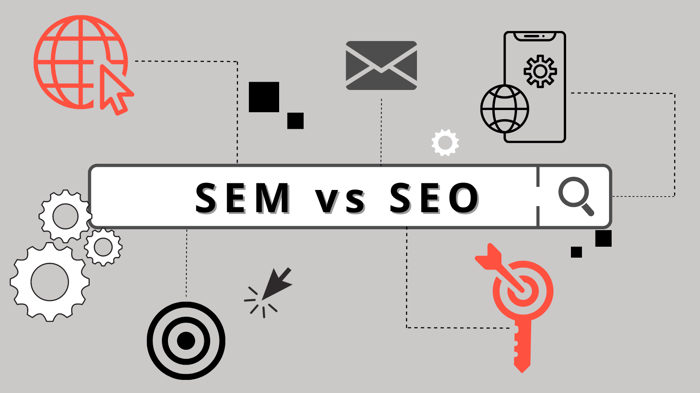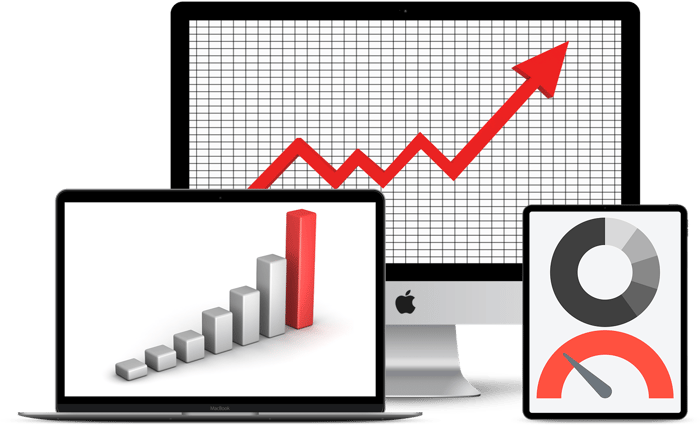Search engine marketing explained

You may have heard the term SEM thrown around in the digital marketing world, but do you know what it is and why it’s so important? Search engine marketing (SEM) is similar to search engine optimisation (SEO) in that it helps to improve a business's search engine presence and visibility. It ensures your website can be easily found by internet searchers with a high likelihood of making a purchase. SEM is one of the most effective methods of growing a business, especially in today’s competitive landscape. With there being approximately 5.6 billion searches made on Google every day, using SEM can be your greatest asset for getting in front of your audience, increasing your sales, and growing your business.
SEM used to be an overarching term under which SEO and PPC advertising lived. Over time, however, SEM has become synonymous with paid search results while SEO has remained the domain of organic search ranking. But more on this later.
What is SEM?
While SEO focuses purely on getting your website as high up Google’s search rankings as possible, SEM is a facet of digital marketing involving paid advertisements. The goal is for your advertisement to rank highly on search engine results pages (SERPs) to increase your visibility. This is achieved through advertisers bidding on keywords (specific to your business) that potential customers may use when they’re researching certain products or services. This provides the advertiser with an opportunity for their advertisement to be displayed with the results for that search query.
A widely known SEM tool is pay-per-click (PPC) advertising, whereby advertisers offer an amount they’re willing to pay for each click their ad receives. The key benefit to this type of marketing is that you can place your advertisements directly in front of motivated customers who are ready to make a purchase. This, in turn, is why SEM is such an effective marketing tool.
However, even if you excel at SEM it won’t be enough on its own. For SEM to be truly successful you need to combine it with an SEO strategy. The two must co-exist as your SEO strategy will inform you of which keywords to incorporate into your SEM ads. This will ensure that your SEM efforts are targeting what your audience is looking for.
Optimising your website for certain keywords will not only help your organic search rankings but can help you pay less for your PPC advertising. Search engines such as Google factor in the relevancy of your website to the advert, and the user’s searches to determine whether it’s shown. That’s right, it’s not always the highest bidder that wins the SEM war!
SEM vs SEO

While these terms are often used interchangeably, they shouldn’t be. The most notable difference between the two is one is paid for and the other is totally organic. SEM is paid advertising where a business will pay Google to display its ads when someone performs a Google search. SEO is a focused effort to earn a free position in search engine results pages by having the most helpful and relevant content for a search query.
These two marketing tactics should be used in conjunction with each other to optimise the results of your marketing efforts. SEO is an amazing tool to drive traffic to your website over a long period of time, while SEM quickly drives customers to pages on your site. In this respect, SEO is a long-term and sustainable approach, while SEM can give you a quick boost when you need it. Both are integral parts of any digital marketing strategy and both can be run together to continue to fuel digital growth.
Why’s SEM so important?
How many times have you searched for something on Google, clicked on the first link you saw? Did you check whether it was an advert or an organic result? This happens every single day and SEM is one of the reasons behind it. It ensures that your target audience sees the content you have created for their search query. Essentially, it enables you to attract customers who are in the perfect mindset for making a purchase. Another perk is that you’re no longer competing for an organic space as paid advertisements are displayed at the top of results pages. This will allow you to connect with your audience, increase traffic to your website, as well as boost your conversion rate.
With SEM, you're only paying for advertising that results in website visitors, which makes it a highly effective way to spend your advertising budget. PPC providers only charge you when your advert is clicked on, rather than when it is viewed, which can help justify the marketing spend. Also with each new website visitor your website’s organic rankings can improve - so SEM can actually assist your SEO efforts. While many aspects of digital advertising can be quite invasive and pushy, SEM and PPC advertising do not disturb a customer’s activity as it’s merely another search result for their query. Overall, SEM is one of the most efficient and effective means of increasing your website traffic and conversion rate, especially while you wait for your SEO marketing efforts to take effect.
How does SEM work?
Looking at PPC advertisements in particular there is an ad auction that occurs whenever someone carries out a Google search. The advertiser submits a list of keywords and a budget, and Google determines if those keywords are relevant to someone's search query and if so, enters the advertiser into the ad auction.
In order to be successful, you must outperform your competitors. While there are many factors Google considers, your maximum bid and your quality score are the two most important components. Therefore being the highest bidder does not actually guarantee you will win the auction. The quality score is often weighed more heavily as it determines how relevant and helpful your website is to the searcher, which can enable you to achieve a higher position at a lower cost. The result of Google’s calculation is your ad rank.
Our top tips on how to implement and improve your SEM

1. Start small
Ease your way into SEM with a couple of PPC campaigns. That way it’s easier to track and manage, and you have more time to analyse and optimise.
2. Be specific
Ensuring your paid keywords are specific and relevant to your content is imperative. While there is a place for broad terms, specific keywords often provide the highest quality traffic.
3. Be deliberate with your targeting
Don’t target certain locations or demographics in the hope of gaining additional traffic. Only target people in your niche with the means and motive to purchase from your brand, anything else can blow your budget without producing results.
4. Optimise your landing pages
Don’t forget about where customers are going to land after they click on your ad. To help increase conversions, it’s important to optimise the copy and design of your landing pages. This also means aligning everything with your keywords and, consequently, the user’s search query.
5. Don’t shy away from negative keywords
Negative keywords help you maintain relevance. For example, if you own a ball gown company and someone searches for ‘ball gown alterations’, they probably won’t buy a ball gown from you. By using ‘alterations’ as a negative keyword, you won’t show up in this irrelevant search query.
6. A/B test your ads
Try out two different treatments of messaging and test them to gain a better understanding of what kind of wording entices your target market to click.
7. Monitor & optimise
Always monitor the success of your ads to ensure you’re making a satisfactory return on your ad spend. If they're successful, keep them running and producing results. If not, it’s time to try another ad!
SEM is an incredibly efficient way to increase website traffic, boost sales, and grow your business. Although, as we’ve discussed, you can’t have effective SEM without solid SEO practices and it can be difficult to master SEM, especially with the changing nature of digital advertising in New Zealand. Both SEO and SEM must be employed together for the greatest search engine results and visibility. Continuous improvement is required to deliver measurable long-term success.
Now that you know the basics of SEM, it may be a good idea to turn your attention to some SEO principles. To increase your understanding of SEO and to learn some actionable tips, download our free guide to smarter SEO.
Download your free guide to Smarter SEO
Good SEO can mean the difference between your business being found, or you being lost in the growing mass of online resources. This guide is designed to help you rise above your competition.
Download now





